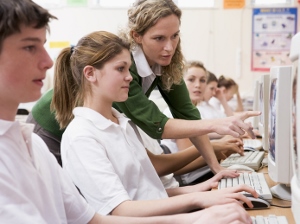

<p><img class=" alignright size-full wp-image-1076" src="http://schoolnewsnz.fastrackdev.com/wp-content/uploads/2014/09/SND07-wk4-Expectations_300x224_copy.jpg" alt="SND07-wk4-Expectations 300x224 copy" style="margin: 5px; float: right;" width="300" height="224" />Students&#8217; success can be improved by a teacher with high expectations for their entire class.</p>
<p> <!--more--> </p>
<p>That&#8217;s the view of University of Auckland academic Associate Professor Christine Rubie-Davies, head of the School of Learning, Development and Professional Practice at the University&#8217;s Faculty of Education.</p>
<p>She has written Becoming a High Expectation Teacher. Raising the Bar, to help teachers reach that goal.</p>
<p>&#8220;I witnessed that teachers who I perceived had high expectations for all their students, appeared to have a huge positive effect on not only their students&#8217; achievement but also their self-belief,&#8221; she said.</p>
<p>Associate Professor Rubie-Davies was a primary school teacher for many years before joining the university. She decided to write the book after hearing policy makers and schools call for teachers to have high expectations, but never offering any advice on how to achieve that.</p>
<p>Her research career has involved identifying teachers who have high expectations for all their students (high expectation teachers) versus those whose expectations are low for all (low expectation teachers).</p>
<p>&#8220;There appears to be a clear understanding that high expectations are important for student achievement, but what does having high expectations look like?</p>
<p>&#8220;Does it mean that teachers indulge in lots of self-talk – &#8216;I must have high expectations&#8217;? Does it mean that teachers should plan learning experiences well in advance of what they believe their students can achieve – and perhaps watch them fail?&#8221;</p>
<p>The book is based on the first-ever intervention study in the expectation area designed to raise teachers&#8217; expectations for all students. It explores three key areas that high expectation teachers enact differently: the way they group students for learning, the way they create a caring classroom community and the way in which they use goal setting to motivate students and to promote student autonomy and mastery learning.</p>
<p>The study ran over three years (2011-2013) and involved 84 teachers, of whom 43 were in the intervention group and 41 in the control group. At the beginning of the study there were over 2500 students. Students were tracked across the three years of the study, so there were closer to 5000 students by the end.</p>
<p>Associate Professor Rubie-Davies has already received high praise for her work. Distinguished Scholar Professor Patricia Alexander of the University of Maryland has described her book as an &#8220;absolute privilege&#8221; to read.</p>
<p>&#8220;You have succeeded in capturing the rich and empirically solid literature on teacher expectations in language that is readily understandable to educators at all levels of practice – from beginning teacher to seasoned university professor.&#8221;</p>
<p>The book is available at the UBS Bookshop, on Amazon: http://www.amazon.com/Becoming-High-Expectation-Teacher-Raising/dp/0415713374 .â¨Learning Network NZ: http://www.learningnetwork.ac.nz/shared/products/productBook.aspx?id=TF13375 It can also be purchased directly from the Routledge website: <strong><a href="http://www.routledge.com/books/details/9780415713375" target="_blank">http://www.routledge.com/books/details/9780415713375</a></strong></p>

NZEI Te Riu Roa is considering legal action against the government for the disestablishment of…
NZQA is implementing AI-marking for all Year 10 written assessments from this year onwards, following…
Teaching personal financial responsibility isn't enough. Children should be taught broader economic context, argue New…
When students can't hear the teacher, they can't learn properly. Sound quality matters in education…
The Garden City is rich with learning opportunities, no matter what subject or part of…
Teaching Council of Aotearoa launch school leaders’ stories project with Unteach Racism to challenge institutional…
This website uses cookies.